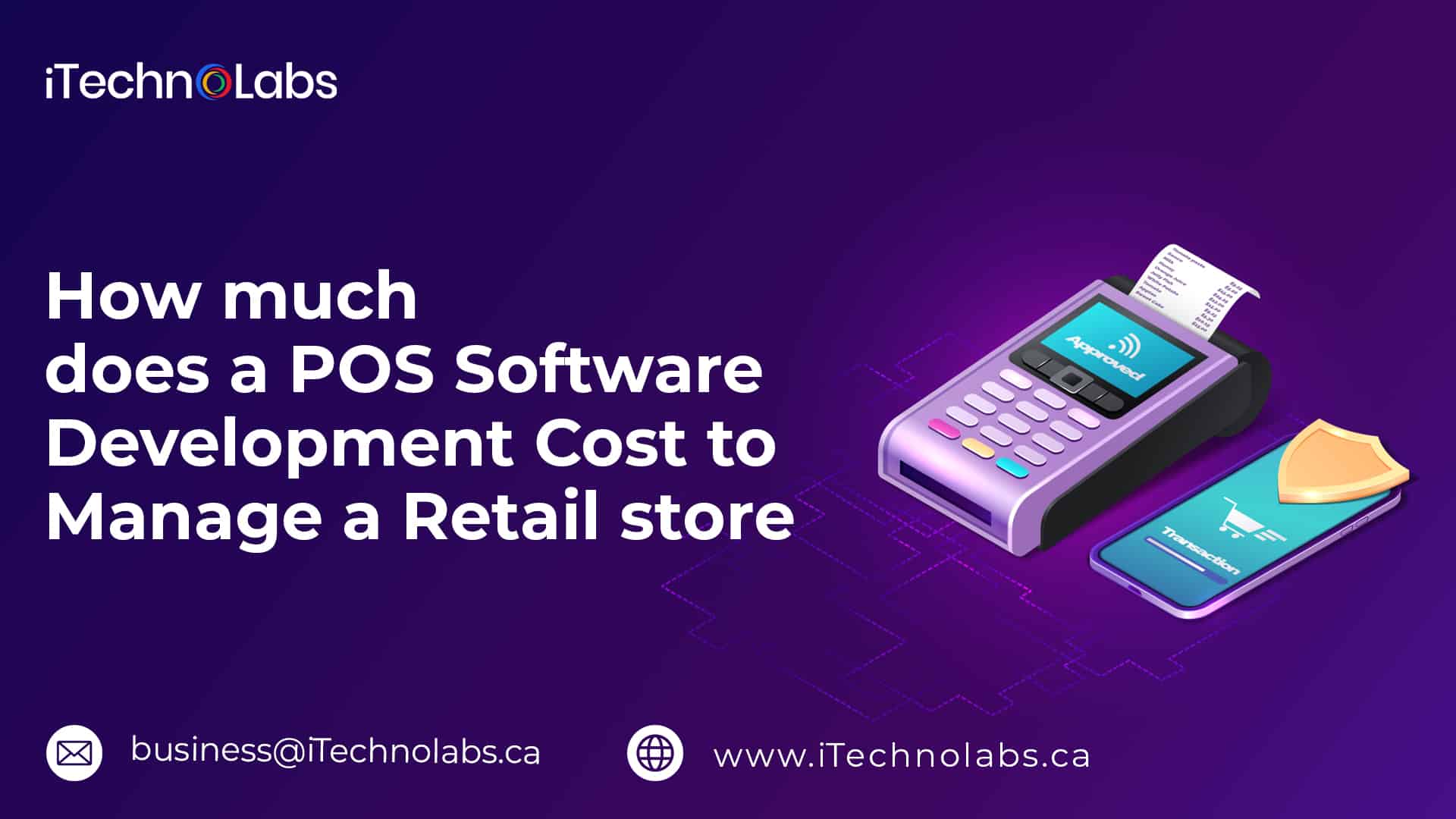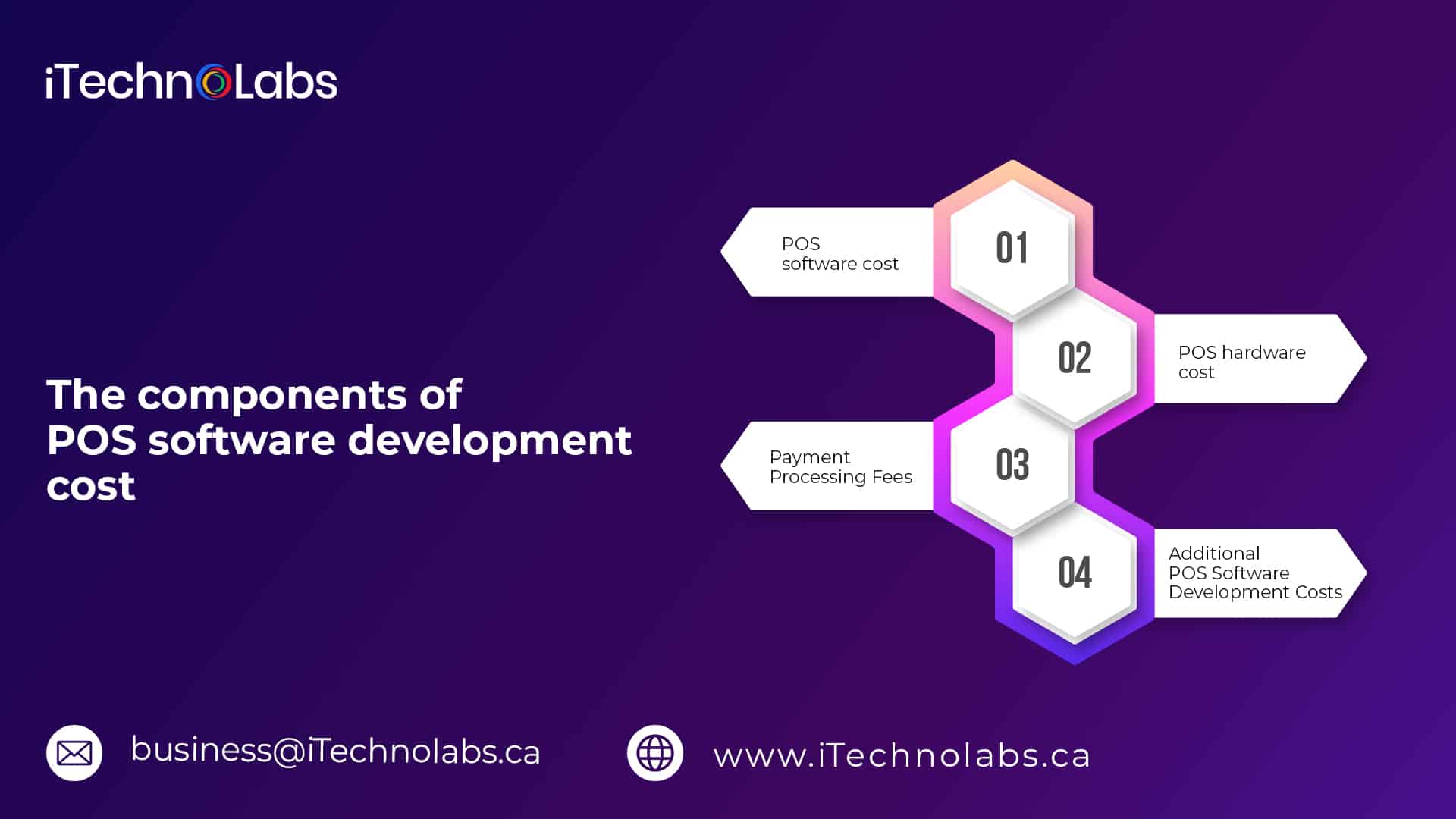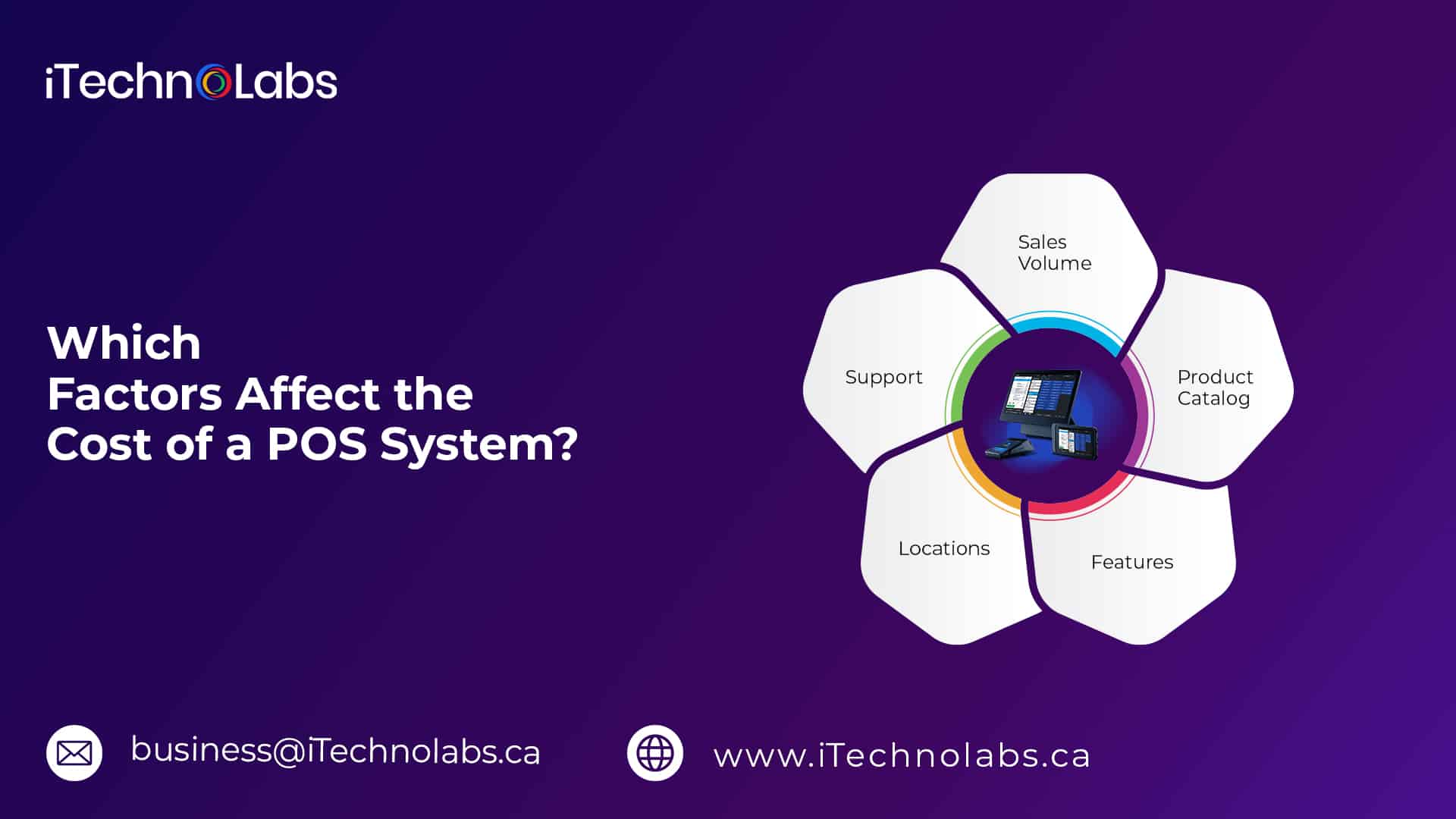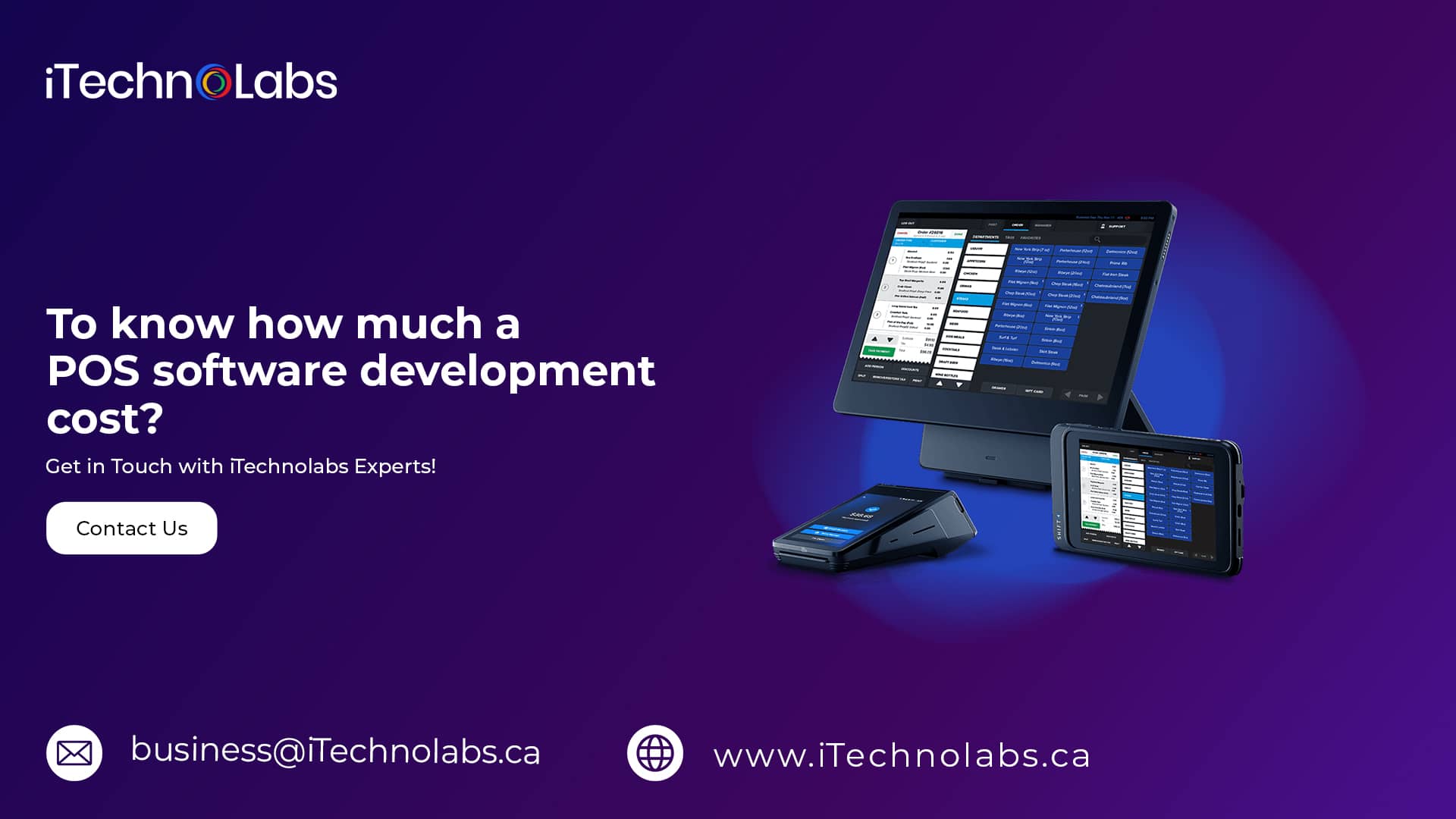Last updated on January 25th, 2023
The retailers of today have a wide choice of options when it comes to points of sale systems. An on-premise POS such as Magento POS can be perfect for larger businesses that have multiple locations as the hardware used is generally more robust. Furthermore, its software is reliable and offline-friendly and you can use multiple POS accounts and customize the solution to your needs. Small businesses typically opt for cloud-based POS since it’s less costly. But, you could think, “How much does a POS Software Development cost?”. This article will tell you all you must know about costs for POS systems in 2023 and how iTechnolabs can provide you with the best POS software solution for your business.
How much will a POS software development cost?
The price of the POS system can range from $3000-$10,000. But the precise POS cost will depend on the choice of POS hardware software, hardware, and degree of customization. For instance, while certain POS software is only compatible with devices that are part of their brand, however, open-source POS software can be used on the majority of devices available on the market. Furthermore, prices vary according to the process of processing credit cards, particularly for small-scale retailers. You can see that a variety of aspects can affect the price of a POS system, and no one answer is universally applicable. Although iTechnolabs have certain readymade POS software solutions that are business friendly as well as cost-effective like Sunmi POS Software.
According to a Consumer Research survey, 45 percent of customers are extremely uncomfortable waiting in checkout lines, and 20% report that this occurs frequently. Thus the use of a user-friendly POS system can ensure more efficient day-to-day operation, which leads to better customer retention as well as lower maintenance expenses. So, to know the answer to “How much does a POS system cost?”, you must know the nuances of a POS price to choose the most suitable solution for your business’s profit.
Also, read: How to Build Your Own Custom POS Software Solution?
The components of POS software development cost
A point-of-sales system’s costs are comprised of two main components: software and hardware cost. The cost for this POS software development is related to the processing of credit cards. So, you should begin by selecting a couple of POS options that are suitable for you. You should then compare POS rates and fees for transactions (including monthly charges and PCI costs to comply with PCI). A small discount could save you hundreds of dollars in the long term, which is worthwhile doing the work. Additionally, prices can change when you add new features, integrations, and features. We’ll then dissect these fundamental elements in the following manner.
1. POS software cost
The cost of POS software varies from $10 to $250 monthly, based on the kind and model of POS. There are three main kinds of POS software:
- Cloud-backed POS program that is based on the SaaS model.
- Legacy or on-premise systems for POS that are hosted on a local server, or on-premises
- Hybrid-POS offers a combination setup that combines cloud-based with on-premise
Although they have a higher cost of initial hardware and installation, however, on-premises POS systems usually have lower charges for point of sale over the long term. This is why an on-premise POS can be used for retail stores, while cloud-based POS systems are more common for restaurant owners.
2. POS hardware cost
The hardware POS cost is between 20 to $2000. The general rule is that POS hardware refers to the equipment used to process orders and handle payments for customers. The majority of businesses require the following equipment for their POS system to process payments:
- Reader for cards: $20-50
- Tablet stand: $50-200
- Barcode scanners: $30-100
- Receipt Printer: $35-150
- Cash drawer and Till: $5-200
- Touchscreen: $250-800
- Menu board with digital menu: $200-2,000
- Kiosk: $200-700
Some retailers or restaurants prefer to take transactions directly on the sales floor or tables. To meet this requirement it is possible to use special hardware devices, such as portable card readers. However, other types of POS require various kinds of POS hardware, and they can be used in multiple stores.
3. Payment Processing Fees
The most often overlooked expense for a merchant is payment processing costs which can result in a significant cost over the long term since they’re an ongoing expense for the business. This is the reason you must spend time researching your choices.
For those who aren’t experienced with payment processing when a client uses a debit or credit card, you’ll have to pay a fee to complete the transaction. Payment processors like Bambora, as well as Global, our third-party service providers process credit card transactions for fees.
Certain POS vendors function as their processors for cards (Square and others.) while some offer integrated payments. Based upon the scale of your company you should expect to pay at minimum 2.6 percent plus a tiny transaction cost per transaction. As with the hardware you use, it is best to choose one that is compatible perfectly and is compatible with the POS system. A lot of POS firms offer discounts for customers who opt for the preferred processors for payment.
4. Additional POS Software Development Costs
Apart from POS hardware and POS software development costs, POS systems associate with many other point-of-sale charges, which include:
- Transaction fee: The fee you pay for each credit or debit card transaction, which is usually determined by the amount of your customer’s purchase, plus a few cents
- User accounts Certain POS software restricts employees’ accounts to specific plans. If you require additional logins for your employees, you must be paying more.
- Amount of sites: Similar to user accounts, any additional hardware to support more locations, for example, more cards or registers, will cost more.
- Extra features: Contemporary POS solutions provide more than just payment. Other features such as reporting on sales, inventory management as well as loyalty administration are typically cost-free. It is possible to pay more to get more options.
- eCommerce Integration: You’ll want to sync sales data across both channels when you’re an online retailer that has both brick-and-mortar stores along with an online store. In other words, if the eCommerce platform you use is Magento you’ll want to know what your POS price is about the expenses of operating the Magento website.
What is the price of basic POS equipment cost?
The most popular choice for small-sized businesses is a POS that is cloud-based since it doesn’t need bulky hardware or multiple drives to store information. A basic POS system costs about $69 per month for cloud-based software that has one register and $1300 in the case of POS hardware. This is more affordable than the POS cost for a standalone system initially.
However, the on-premise POS systems are more affordable over the long term since they only require one-time fees. Particularly open source options like Magestore Open Source POS don’t require the hardware of a particular brand. Therefore, you can pick the best hardware to incorporate into the POS system.
Which Factors Affect the Cost of a POS System?
1. Sales Volume
Based on the volume of sales of your company, some companies will charge a portion of the sales you make in their fee arrangement. Apart from monthly subscriptions, companies can pay as much as 2.5 percent for each transaction.
It is a good idea to determine the monthly sales and then figure it out along with any sales taxes that are stipulated by the provider of point of sale.
In time, these obligatory costs can mount to a significant amount. The benefit? POS Nation will never charge any transaction fees. Begin accepting customers now and don’t be concerned about losing a portion of your revenue.
2. Product Catalog
Do you have an extensive inventory of products that come with several SKUs? In some cases, point-of-sale vendors might charge extra fees to handle massive databases. This could be a deterrent aspect for larger companies.
Our inventory system for retail stores is one of the most robust on the market, with support for an unlimited number of products. Yes, you read it right There is no limit to the number of products or SKUs of products you can use for your company.
You can also upload a listing of products or just particular items. The database will keep track of details such as UPC, vendor’s name department category, price of the day, and the cost of sale.
3. Features
In some instances, some point-of-sale providers might charge additional features. Most vendors provide basic plans that include a handful of options, however, add-ons such as gift cards, reporting, or label printing could be subject to an additional charge.
Our POS software development includes cloud-based features which include a robust report dashboard and a virtual back end. Furthermore, all of our packages offer the most popular features used by companies in the industry you work in.
4. Locations
The size of the company could affect POS pricing, especially if you manage an enterprise that has several locations. Each additional location or register is charged extra under the majority of plans.
Other vendors also offer plans that accommodate an unlimited amount of outlets, registers, and locations. POS Nation has supported single-location and multi-location companies, organizations, and companies.
5. Support
Certain vendors provide paid support to assist you in making the most of your computer. The customer service provided by POS Nation is what differentiates us from other companies. Every point-of-sale system includes free access to our online video training library.
Many customers opt to choose to join our support program monthly to get additional training opportunities that are hands-on and instructional videos. Our onboarding program can help members of your staff members get up and running quickly and quickly.
Related Article: Top 10 Things You Need To Know About Custom POS Software Development
To know how much a POS software development cost?
iTechnolabs provides the best POS Software Solutions to manage your retail business. With a team of dedicated professionals, the company strives to offer budgeted and cost-effective solutions for your POS system.













